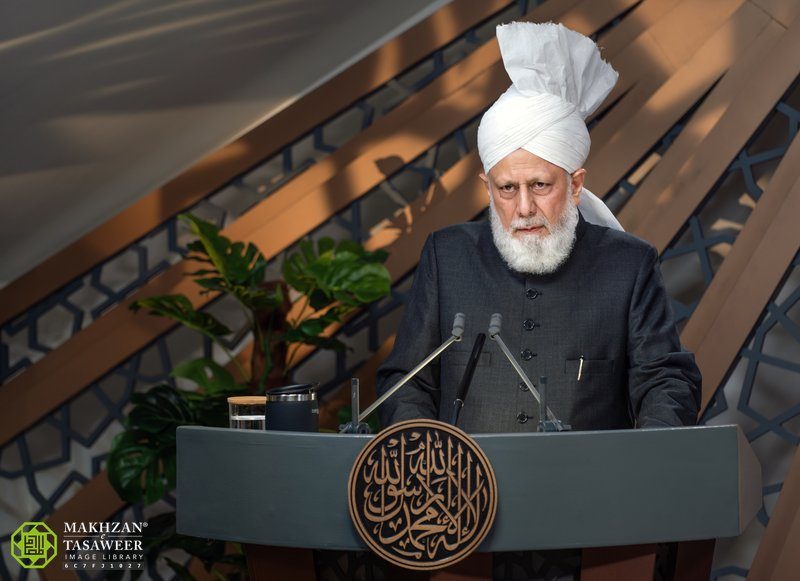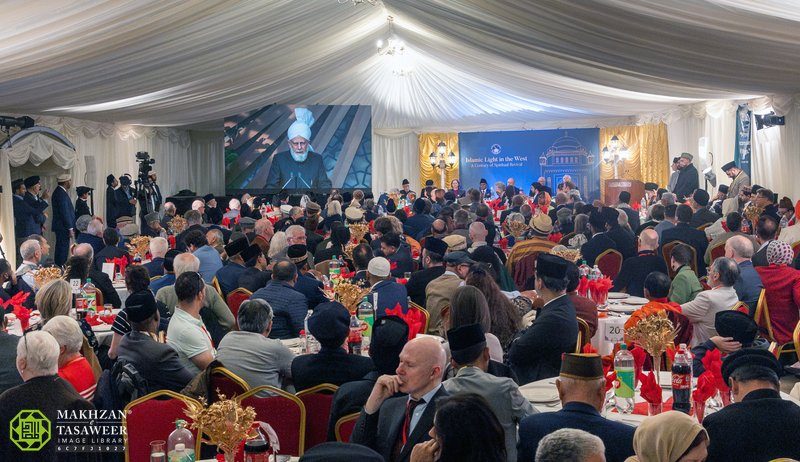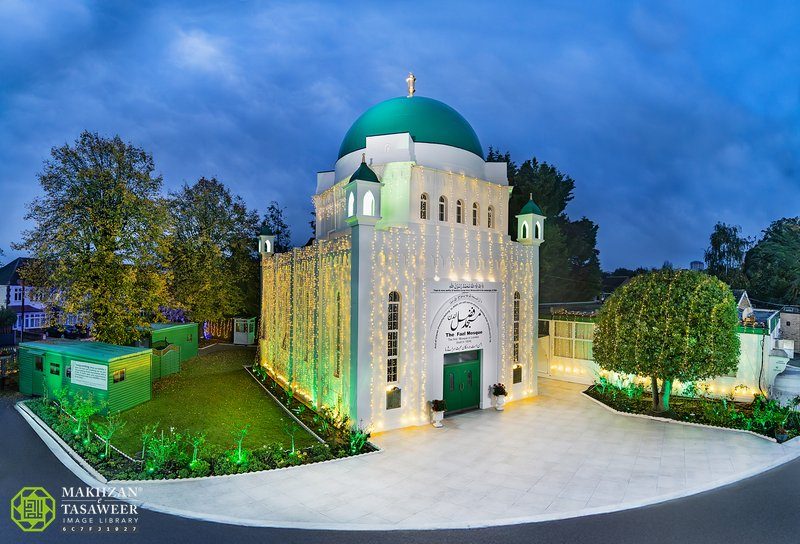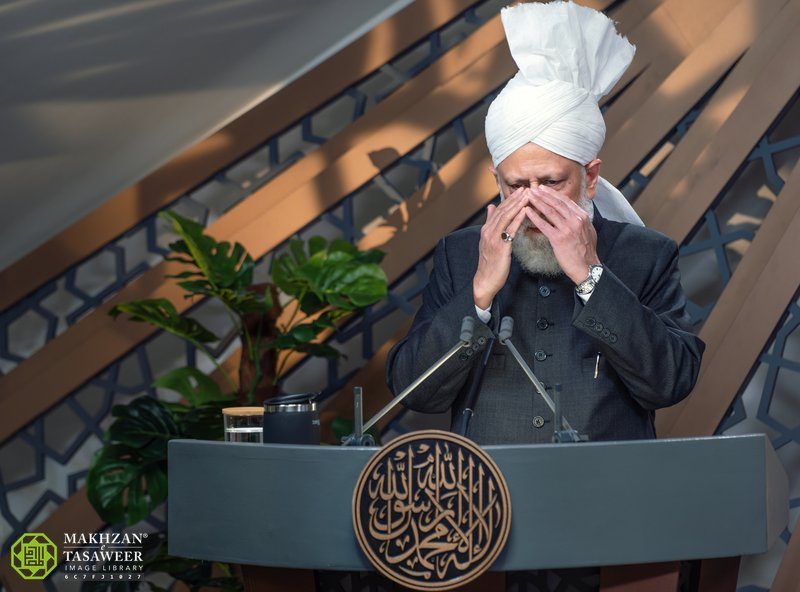
100 Years of London’s Oldest Mosque: A Symbol of Tolerance, Justice and Spirituality
Official Transcript of Keynote Address by the Worldwide Head of the Ahmadiyya Muslim Community at the Fazl Mosque, London Centenary Event

*Please note that this transcript may not be reproduced without express permission either on other websites or in print format.
After reciting Tashahhud, Ta`awwuz and Bismillah, His Holiness, Hazrat Khalifatul Masih V (aba) said:
‘All distinguished guests, Assalamo Alaikum Wa Rahmatullahe Wa Barakatohu –may peace and blessing of Allah be upon you all.
Today, with profound gratitude to Allah the Almighty, in our hearts, we are holding this reception to mark and celebrate the centenary of the foundation stone laid at the Fazl Mosque in London.
The reception or events associated with our mosques are entirely unlike worldly functions, as they are free from all material objectives or pursuits. A mosque is a spiritual sanctuary where individuals congregate to worship Allah the Almighty five times a day to foster spiritual growth and moral development.
Today, we live in an age of rampant materialism where money and power reign supreme. Increasingly, people are turning away from God Almighty, rejecting His very existence and forsaking moral values. At such a time, the light and value of a mosque shines even brighter for a religious person who believes in God and who trembles at the mere thought of moving away from Him. In our view, Islam stands distinct in its unshakeable conviction in the belief of the Oneness of God Almighty. Indeed, the Holy Qur’an proclaims that the very purpose of mankind’s creation is to worship God.
Here, the concept or meaning of worship should not be misunderstood as being limited only to the formal worship of God. Certainly, it is a fundamental obligation upon Muslims to fulfil the rights of Allah by congregating in mosques and offering the five daily prayers. However, the Holy Qur’an explicitly states that a person’s supplications shall be rendered meaningless and be rejected if they neglect their responsibilities towards their fellow human beings. Thus, the prayers and prostrations of every single Muslim are inextricably linked with their treatment of God’s creation.
Hence, where Muslims must, according to the Islamic method of prayer known as Salat, bow down before Allah the Almighty, they must also uphold the rights of mankind and manifest compassion, empathy, and love towards all people irrespective of their faith or background. And it is worship in the fullest sense of serving God and His creation that lies at the heart of being an Ahmadi Muslim. It is our purpose and our mission.
So today, as we celebrate 100 years since the laying of the foundation stone of the Fazl Mosque, Ahmadi Muslims must reflect upon these objectives. Only by fulfilling our responsibilities to both God and humanity can we truly honour the purpose for which this mosque was built and do justice to the objectives of this centenary celebration.
A beautiful Islamic principle taught by the Holy Founder of Islam, the Holy Prophet Muhammad, peace and blessing of Allah be upon him, is that a true believer loves for others what he loves for himself. This guiding principle requires those devoted to God to strive to ensure their every movement and act is a source of benefit for others.
Indeed, inspired by the noble teachings of the Holy Founder of Islam, peace and blessing of Allah be upon him, whatever good things Muslims desire or value for themselves, they also wish for other people, and they should. Accordingly, if we value and draw benefit from our religious teachings, it is our duty to convey them to others. However, before propagating our faith, it is incumbent that we ourselves act upon it. Only then, with heartfelt emotion and sincerity, can we guide others towards the everlasting blessings and infinite value of worshipping Allah. Only then can we convey the immaculate and noble teachings of the Holy Qur’an to others and invite them to Islam.

Undoubtedly, it is our deep desire that people from all walks of life and backgrounds come to live in peace and security, bound together by mutual bonds of love and respect for one another. This is the message we strive to spread throughout the world so that humanity may break free from the shackles of division, disorder and discord. Instead of leaving behind a legacy of misery and destruction for those who follow us, we should recognise that we are all the creation of God Almighty and work together to safeguard our future generations from all forms of warfare, conflict and hatred.
These are the values instilled in our community by our founder, Hazrat Mirza Ghulam Ahmad of Qadian, who we believe was sent by Allah the Almighty as the Promised Messiah and Imam Mahdi, the guided one, according to the promise of Allah and the prophecies of the Holy Prophet Muhammad, peace and blessing of Allah be upon him. He founded our community with the objective and mission of reviving the true spirit and teachings of Islam and guiding humanity towards peace, justice, equality and tolerance.
We believe Islam to be a universal religion and that, as proclaimed in the Holy Qur’an, the Holy Prophet Muhammad (sa) was sent as a prophet for all mankind. Similarly, we believe the Promised Messiah, peace be upon him, came to enlighten the people of all nations on how to fulfil the rights of God and his creation. Upon his advent, the Promised Messiah, peace be upon him, felt extreme anguish and fervent desperation as he witnessed the prevailing spiritual darkness and moral decay that had engulfed society. He yearned for people to recognise their Creator to fulfil the rights of one another.
Observing his profound anguish, Allah the Almighty bestowed His grace, and through divinely inspired prophecies and science, He reassured the Promised Messiah, peace be upon him, of His unwavering support and the ultimate success of his mission. And today, with the grace and mercy of Allah, we are witnessing the fulfilment of that divine promise as the message of true Islam awakened by the sorrow and heartfelt prayer of the Promised Messiah, peace be upon him, has reached every corner of the globe. Despite facing sustained persecution and opposition in certain countries, the Ahmadiyya Muslim Community is now established in over 210 nations and territories of the world. It remains constantly engaged in spreading Islam’s universal teachings of peace, of fulfilling the rights of God and of service to humanity.
Furthermore, the Ahmadiyya Muslim Community’s efforts to convey Islam’s teachings in the UK and Europe are also a direct result of the fervent desire ingrained within the heart of the Promised Messiah, peace be upon him, for the salvation of mankind. In terms of this country, it was through a dream that Allah the Almighty gave the Promised Messiah, peace be upon him, glad tidings, assuring him of divine help and informing him that people in this country would be receptive to his message.
Narrating his dream, the Promised Messiah, peace be upon him, said,
“I saw that I was standing on a pulpit in the city of London and was pronouncing upon the truth of Islam in the English language in a very logical and well-reasoned manner. Thereafter, I caught several birds sitting upon small trees. They were white, and their bodies resembled those of partridges.” He further said, “I interpreted this to mean that though I would not be able to travel to England, my writings would be published there, and its truth would attract many righteous English people.” (Izala Auham, Ruhani Khaza’in, Vol. 3, p. 377)
With the grace of Allah, the manifestation of this dream first began to materialise when, during the era of the First Caliph – the spiritual successor of the Promised Messiah, peace be upon him – our community sent a pioneer missionary to England for the sake of spreading Islam’s teachings. At that time, early in the 20th century, awareness of Islam was very limited in this part of the world. Despite minimal resources, our missionary diligently conveyed Islam’s teachings. Some pious local people proved very receptive to Islam’s true teachings and joined the Ahmadiyya Muslim Community.
Thereafter, in the era of the Second Khalifa, Hazrat Mirza Bashiruddin Mahmud Ahmad, more missionaries were sent to the UK to further introduce the teachings of Islam in this country. Their presence reaped positive results, and the teachings they spread were a means of enriching this country. Soon, the need for a dedicated place of worship to foster the growth of Islam in this country became apparent. And so, it was then that our community embarked on a project to build a mosque in London. From 1920 onward, Ahmadi Muslims diligently raised funds through personal sacrifices and contributions. Their collective efforts culminated in the purchase of the plot of land in Southfields. It would serve as the location for the first mosque in London.

It was decided that the mosque would be named the Fazl Mosque, meaning Mosque of Divine Grace or Mosque of Blessings. Thereafter, in 1924, on the occasion of the British Empire Exhibition at Wembley, it was suggested by an organiser that a conference of the world’s major religions should also be convened and that the representatives of all major faiths should be invited.
In this regard, the organisers invited our missionary in the UK at that time, Imam Abdul Rahim Nayyar, to speak about Islam. Given the event’s significance, representatives of our community suggested that the Second Caliph himself should travel from Qadian in India to address the event on behalf of Islam. As such, in 1924, the Second Caliph travelled to the UK to participate in the Conference of Living Religions. To coincide with his visit, it was also decided that the construction of the Fazl Mosque should commence.
Thus, exactly a century ago, the Second Caliph graced the land in Southfields where you are sitting and laid the foundation stone for the Fazl Mosque, which proved to be a landmark moment in the history of Islam in the UK. On that momentous occasion, the Second Caliph delivered a profound address to the assembled guests outlining the true teachings of Islam and the purpose of building a mosque in the UK.
Here, I would like to present a brief extract of the address. He said,
“Today, we have gathered here for a venture that is unique: to lay the foundation stone for a building that is being constructed solely to remember and submit in servitude to that Supreme Being who has created all the worlds. Those who enter it shall, regardless of their nationality, the government they live under, or the language they speak, unite and come together as one.”
He continued,
“As they turn in the direction of that Divine Being, all differences, be they of status, race, or whether they hail from the east or the west, shall be rendered futile. This is because when one draws ever closer to God, all differences vanish whilst the bonds of unity flourish. Therefore, the building whose foundation stone is to be laid today will stand as a symbol of unity and harmony. It shall remind us that our origin and place of return are indeed the same. Thus, we should not allow differences that exist between us to cause conflict or discord.”
In words that are as pertinent today as they were at the time, the Second Caliph said, “Differences and disagreements have always existed in the world and always will. As long as humans have the capability to progress and innovate, there will surely be differences and disputes because the progress of the world results from such disagreements and differing ideas.
Indeed, the Holy Prophet Muhammad (sa) said that differences are a blessing, not a curse. Instead, it is intolerance that is harmful as it is the means of stifling progress and forcing conformity.”
The Second Caliph continued by saying,
“In reality, nothing has damaged unity as much as the fact that some people adopt coercive matters in the name of establishing unity that is completely contrary to their stated objective.
Paradoxically, the pursuit of unity and societal cohesion has suffered far greater injury from its misguided allies than from its adversaries. Therefore, a person must always exhibit tolerance and respect.”
He said, and today I reiterate, that diversity is actually a means of enriching society and enabling progress and development to occur.
During his address, the Second Caliph eloquently explained that the sacred mosque in Makkah was built as a unifying force where people from all nations could gather to worship Allah the Almighty and foster peace, harmony, and mutual love. Similarly, the Fazl Mosque was to be built to fulfil the same noble objectives.
He said, “Before laying the foundation stone, I would like to affirm that this mosque is being built solely and exclusively for the worship of God Almighty so that the love of God may be established in the world and people may be drawn towards religion without which true peace and progress is not possible.”
He further said, “We will not stop anyone who wishes to come here to worship God Almighty from doing so, provided they adhere to the guidelines set by the administration and respect the right to worship of those who are building this mosque.” He said, “I am confident that this mosque will foster a spirit of mutual tolerance and respect that will play a great role in eliminating all forms of conflict and discord from society and in nurturing peace and security in the world.”
He said, “The day will soon come when people will jettison war and conflict and live together harmoniously and with the spirit of love and affection. That day shall soon come when humanity will realise that because the Creator of all mankind is the same God, they should live together with even greater love and affection than one holds for his brothers and sisters. Rather than obstructing one another’s progress and advancement, people shall offer a helping hand to aid their development.”
On that occasion, the Second Caliph’s address laid out a glorious vision for the Fazl Mosque, that it would serve as a means of worshipping God, serving humanity, and spreading Islam’s teachings of peace and unity. Today, a century later, all Ahmadi Muslims remain steadfast in their commitment to fulfilling those same objectives and ensuring that our mosques are forever beacons of peace, unity, and devotion to Allah the Almighty.
Unquestionably, we live in an era of profound turmoil and find ourselves amidst a storm of unrest and global conflict. Across the globe, wars are raging. Lives are being tragically lost in unimaginable numbers. And we are witnessing a blatant disregard for the rights of Allah the Almighty and the rights of humanity. Instead of upholding human values, we witness a ruthless pursuit of vested interests that not only risks the destruction of millions of lives today, but also casts a very long and bleak shadow over the future of humanity.
Undoubtedly, the consequences of our actions today will reverberate through time and shape the world our children inherit from us. Therefore, as the creation of the One God, we must extinguish the flames of war and conflict that are burning. And as a religious person, it is my conviction that this requires us to fulfil the rights of worship owed to God Almighty.
We earnestly desire that all people, irrespective of their beliefs, may unite in fulfilling the rights of their Creator and play their respective roles in sowing the seeds for lasting peace in the world. By doing so, we can save ourselves from divine wrath and secure a future of peace and prosperity, both in this life and the next.
As Muslims, we believe that this worldly life is just a fleeting passage on the way to the eternal life that awaits us in the hereafter. We believe that our deeds in this world will echo into eternity, where our actions will be weighed on the scales of divine justice, and we will be held accountable for our choices.
And so, if, God forbid, humanity ever again witnesses the horror of nuclear warfare, the harrowing consequences will be felt for generations to come. Innocent children will be born with physical or mental disabilities. Generations will be consumed by trauma, rage, and hopelessness, all because of our selfishness and failure to uphold peace and justice.
So, as I conclude, it is my heartfelt prayer that may the love of God Almighty and His creation enter the hearts of all mankind. Certainly, it was to achieve this objective that the Fazl Mosque was constructed, and it is for the sake of reiterating this message and recognising the immense blessing of God Almighty that we have held this event today.

May Allah the Almighty enable all of us, irrespective of our faith or beliefs, to play our respective roles in the creation of a society where people of all religions, ethnicities, and backgrounds live harmoniously and manifest grace and love to one another. May He grant us the strength, wisdom, and compassion to fulfil these noble objectives. Ameen.
With these words, I sincerely thank you all for joining us on this historic occasion. May God bless you all. Thank you very much.’



